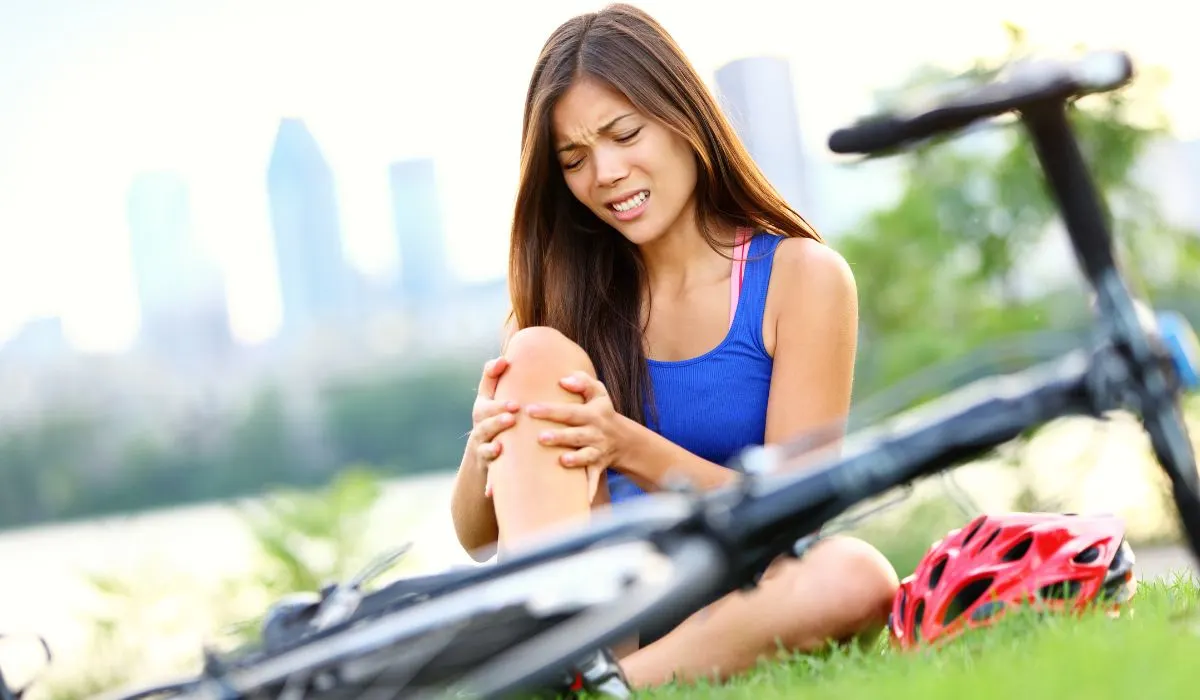
Cycling is a healthy form of exercise that is environmentally friendly, cheaper than using a car, and said to extend your lifespan, but are there any disadvantages that come with cycling? Are there any disadvantages that avid cyclists don’t tell you? Not every aspect of cycling can be good, so what are the drawbacks of this activity?
If you are considering cycling for sport or commuting, there are some important considerations to make sure the disadvantages of this activity do not outweigh the positives, but cycling can still be difficult, and it does come with a frustrating set of challenges. Let’s explore the challenges associated with cycling.
#1: Hazards On The Roads And Accidents
Among the most dangerous disadvantages of cycling are road hazards and accidents. This disadvantage should be a fairly obvious problem with cycling, but it is not something cyclists openly discuss.
The reality is that when cycling for sport or commuting, especially in busy cities or towns, there is always a chance of traffic accidents. Any cyclist can fall off their bike, regardless of how experienced and skilled they are.
This disadvantage can be avoided by making sensible decisions when cycling and not pushing the envelope too much. Still, road hazards and accidents are an ever-present danger for all cyclists everywhere.
#2: Dealing With Weather Can Be Difficult
Another disadvantage to cycling is dealing with the weather. This issue is very near the top of the list of things nobody tells you about cycling because no cyclist wants to complain about it, but the weather is a significant downside for cycling.
Everyone knows that cycling exposes cyclists to adverse weather conditions, but rain and snow are not the only problems to deal with in this scenario.
Cycling on a day with perfect weather conditions is a joy, but if it rains, you will get wet. If the weather outside is cold, you will be cold; if the sun is shining, you will get hot. If there is snow, you will get stuck, and if there is ice, you will slip.
Cold is a real problem when cycling, as it can cause cramping and muscle fatigue. Direct sunshine is a problem, too, as overheating and heatstroke are genuine dangers, as well as sunburn. Most cyclists will experience severe sunburns, and many will experience some form of fatigue due to the weather.
Getting wet on your way to work is frustrating and being drastically delayed by snow is even worse. Weather conditions can be a significant disadvantage for cycling.

#3: Managing Sweat And Hygiene Can Be Challenging
If you are cycling for sport, this issue may not be as intense, but any cyclist who commutes to work will know that managing hygiene and sweat is very challenging.
Arriving to work sweaty and hot from the ride is never favorable, and if you do not have access to a shower at work, you will have to deal with poor hygiene and potentially foul body odor for the rest of the day.
Every cyclist has a way of dealing with these problems, but it can still be an immense inconvenience, and that is why many people stop cycling to work.
Cycling for sport, fitness or recreation does not usually come with this problem, as sweating is expected when cycling for these reasons, but anyone who works with a cyclist will know that cyclist hygiene can be problematic.
#4: Mental Fatigue
Not every cyclist has to deal with mental fatigue, which is why it is not commonly known, but any cyclist who rides in a densely populated city will understand that mental fatigue can be a severe problem.
This mental fatigue comes from being constantly aware of your surroundings and hyper-focused on what is in front of you.
It is mentally exhausting to be constantly aware of:
- cars
- traffic
- pedestrians
- the surface that you are riding on
- your route
- balance
- breathing
- your own body
Being forced to relentlessly be aware of so many things is very mentally taxing, leading to mental fatigue for many cyclists who have to ride in bustling areas. This can lead to a lack of focus after the ride and can be detrimental to work and other aspects of daily life.
#5: Muscle Fatigue And Numbness
Cycling is a very demanding physical activity, regardless of your fitness level or experience. Even the most road-worn cyclists can still suffer from:
- muscle fatigue
- numbness
- muscle pain
Every cyclist will have to overcome muscle pain in the early stages of riding, but even experienced riders will battle with muscle fatigue over time, and every cyclist will have to deal with some form of numbness in their body.
This is a simple reality of cycling, and every cyclist must find their own way of overcoming these issues. Finding the right bicycle for you is essential to reduce these problems, but there is no way to prevent them entirely.
Muscle fatigue and numbness can hinder your cycling ability, which will extend your travel time, increasing fatigue. This problem is a vicious cycle in some circumstances and can be a severe issue for many cyclists.

#6: Longer Travel Times
Cycling is very good for you in many ways, and it is also environmentally friendly; it is among the least expensive ways to travel, but an unfortunate reality of cycling is that it takes a very long time to get anywhere.
Comparing travel times between cycling and using a car or other forms of motorized transport, traveling by bicycle is significantly slower and requires much more effort.
This is a considerable disadvantage for anyone who needs to travel long distances daily and for anyone who commutes to work by bicycle. Adding time to the commute impacts the amount of time required for traveling, which takes away from the productivity of the day
Driving a car to where you are going will take much less time due to the much higher possible speeds. Cycling is good for you, but it is a generally slower way to get around.
#7: Carrying Luggage Is Difficult
Using a bicycle to get around is convenient in many ways. A bike will allow you to get through traffic quickly, and traveling short distances is a joy.
However, cycling can be highly inconvenient if you have something you need to take with you that does not fit into a backpack.
Every cyclist has to travel light, anything they must bring with them must fit within a backpack, and some cyclists have small saddle bags (similar to these sold on Amazon), but anything that cannot be transported in this way cannot be safely moved by cycling.
This reality can be inconvenient and can make simple tasks such as grocery shopping very challenging. There is no easy way to carry many or larger items by bicycle. Every cyclist must resign to this impossibility, and they can never expect to use their bike this way.
Using a car or other forms of transportation is far more functional for this purpose than riding a bicycle.
#8: Ever-Present Discomfort
Using a bicycle for transportation, exercise, or sport can be great in many ways, but very few cyclists ever discuss the ever-present discomfort of cycling.
Along with general discomfort, some examples that are always a part of cycling:
- chafing
- muscle pains
- fatigue
- breathlessness
- sweat
- sunburn
- heat
- cold
- dampness
- foot pains
- hand spasms
- vibrations
- jostling
These issues can be bearable for a short amount of time, and they can be ignored if you only need to travel a shorter distance. If a bicycle is your only means of transportation, these frustrating aspects of cycling can become overwhelming.
Cycling is never comfortable. There is always something that feels difficult or uncomfortable, which is a reality that every cyclist must deal with. No cyclist wants to talk about this reality because if they do, they will never stop talking about it.
Ever-present discomfort is part of cycling, and there is no way around it.
#9: The Potential For Traffic Law Fines
Cycling feels far freer than using cars or public transportation. Using the roads as a cyclist often means skipping stop signs and traffic lights and generally moving freely through streets everywhere.
However, traffic laws are one aspect of cycling that no cyclist likes to deal with. Cycling is not exempt from the rules of the road, and any cyclist can incur the punishment of the law by breaking road traffic laws.
FACT: Cyclists are still required to stop at traffic lights and stop signs and must follow all road rules in every place they cycle.
Some countries and towns have specific laws for cyclists, and some local authorities are more strict about enforcing traffic laws for cyclists, but any cyclist that breaks the rules of the road is liable for fines or other retribution.
Very few law enforcement agents hold cyclists to these rules, but if a cyclist is blatantly ignoring road laws and putting other road users in danger, they are likely to be fined or have their bicycle confiscated.
At the end of it, a frustration for many cyclists is following the rules of the road, but this is something that every cyclist must do, regardless of how inconvenient these rules are.
#10: Mechanical Failures And Making Repairs
Mechanical failures are another disadvantage of cycling. Bicycles break, and many components on bikes break very easily. This means that dealing with mechanical failures can become a part of daily life for cyclists, and making repairs on the road is a reality for every cyclist.
It can be very frustrating to deal with a:
- broken bicycle
- bicycle that is not functioning well
- bike that needs repairs
Minor problems can become significant problems on the road, and taking the time to learn how to fix these issues is not something that every cyclist does.
When a component breaks, it must be repaired or replaced in order for the bike to remain useful. A broken bicycle is nothing more than an ornament, and fixing the bike can be costly and time-consuming.

#11: The Day-To-Day Cost Of Cycling
Not everyone knows that cycling has some regular costs involved, and it may not be as expense-free as some people think.
The cost of repairing and maintaining a bicycle can be high depending on the type of bike that you ride, and every cyclist must obtain the appropriate clothing for cycling. To maintain the vehicle, every cyclist must purchase:
- tools
- accessories
- equipment necessary for maintenance
Cycling clothes are expensive, and they do not last for very long. When a bicycle component breaks, it must be replaced or repaired, which can be very expensive as well. Simple running costs such as cleaning, oiling, and maintaining the bike can become pricey.
NOTE: The daily costs of cycling are significantly lower than most other transportation, but they are still a reality of cycling that not everyone is aware of.
#12: Bugs
This may be a strange thing to find on a list like this, but a disadvantage of cycling that nobody tells you about is the bugs.
Bugs can be a significant problem for cyclists depending on where you live and the seasons that you cycle in. Some areas of the world have overwhelming bug populations, and cyclists encounter them in various ways daily.
Be it swallowing a flying insect, running over a giant bug on the road that splatters up onto your shins, or dealing with stinging insects that swarm near roads in some places, cycling can bring along some very uncomfortable bug encounters.
This is a reality in many places internationally, and bugs are something that cyclists deal with every day, even if they do not talk about it.
Conclusion
In the end of it, cycling is very good for your health. It is an exhilarating way to maintain fitness, it is an excellent way to experience the world around you, and it is generally more mentally healthy than other transportation options, but it does have its own set of disadvantages that every cyclist must overcome.
Learning to find your own solutions to these daily cycling problems is all part of choosing this mode of transport. Whether you cycle for fun or for transportation, you will eventually encounter all of the issues on this list, and they are all essential factors to consider for anyone who wants to take up cycling.
You might also be interested in:
